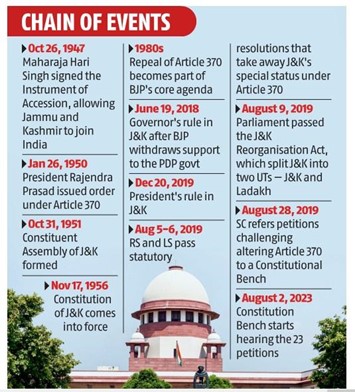PREVIOUS
SC verdict on Art 370
December 14 , 2023
401 days
666
0
- A Constitution Bench headed by Chief Justice of India unanimously upheld the Central government’s 2019 decision to abrogate Article 370.
- Article 370 of the Constitution conferred special status on the erstwhile State of Jammu and Kashmir (J&K).
- The CJI notes that Article 370 was only a provision to take care of the transition from a princely State to the Union.
- The court held that J&K did not retain any internal sovereignty after its integration and that the concurrence of the State Government was not required to apply the Indian Constitution to the State.
- It also upheld the carving out of Ladakh as a Union Territory.
- The court also directed the Election Commission of India to take steps to conduct elections to the J&K Legislative Assembly by September 30, 2024.
Background of special status
- Jammu and Kashmir enjoyed special status under Article 370 of the Constitution of India.
- This Article describes it as a temporary provision and that it will cease to be operative if the President issues a public notification to that effect.
- However, prior to that, a recommendation is necessary from the Constituent Assembly of Jammu and Kashmir.
- As a result of Article 370, Jammu and Kashmir had its own Constitution.
- All laws passed by Parliament will not be applicable to the State, unless the State government gives its concurrence.
- The Constitution (Application to Jammu and Kashmir) Order, 1954, lists the Articles and provisions that apply to J&K.
- Further, the President also listed a set of exceptions under Article 35A of the Constitution.
- This Article does not figure in the text of the Constitution of India, but figures only in the J&K’s Constitution.
- While the 1954 presidential order constituted a founding legal document for Jammu and Kashmir.
- Article 35A protected the exclusive laws – such as the bar on outsiders buying property and women marrying non-Kashmiris losing their property rights - of the State.

Leave a Reply
Your Comment is awaiting moderation.


